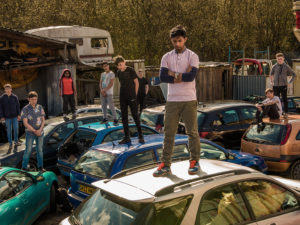We are delighted to share that Super Slow Way, has been awarded a £1 million grant from the Arts Council England’s Creative People & Places programme to continue our work for another three years..

Taking place in 21 places across England with low levels of arts and cultural engagement, Creative People and Places projects are developed and delivered by consortia of local partners, empowering communities to take the lead in shaping local arts provision, to ensure more people create and experience great arts and culture in the places where they live.
The second phase of Super Slow Way 2018-21 is supported by the Canal & River Trust, local authorities of Pendle Borough Council, Burnley Borough Council, Hyndburn Borough Council and Blackburn with Darwen Council, Arts Partnership Pennine Lancashire (APPL) and UCLan as academic partner.
The new grant will enable the multi-partnership project to continue to establish the Leeds & Liverpool Canal corridor flowing through Pennine Lancashire as a place where local communities from Blackburn to Pendle can participate in and enjoy an ambitious, high quality arts programme.
A new series of socially engaged arts projects will be commissioned, to reflect the cultural diversity and creativity of the communities that live along the 20 mile stretch of canal. The project hopes to increase the numbers of local people participating in, and inspired by, arts and culture as audiences, makers and producers, particularly those who might not have previously had access to such activity.
Taking its cue from the Slow Movement, Super Slow Way asks how can we use our time more creatively; bringing art and artists to a space where time slows down, to look afresh at how people live their fast-paced lives and how they relate to their environment, neighbourhoods and to each other.
Laurie Peake, project director for Super Slow Way said: ‘The Creative People and Places funding does what it says on the tin; allowing people to work with artists to create and enjoy work that explores and celebrates what makes this place special and we are so pleased that Arts Council England has recognised what we and our partners in East Lancashire have achieved so far by awarding us another three years’ funding.”
She added: “In projects such as Festival of Making in Blackburn, the award-winning Beyond Labels project with Hollins Technical College in Accrington, the fabulous Burnley Canal Festival and the Shapes of Water, Sounds of Hope project in Brierfield, we have established some great relationships along the canal corridor, with local authorities, arts and community organisations and, most importantly, residents and have exciting plans for the future which we can now put into action!”
Tim Eastop, Producer for the Canal & River Trust’s Arts on the Waterways programme said: “We’re thrilled that Super Slow Way has secured funding for a further three years. This truly unique cultural project is a wonderful example of how our canals can celebrate, unite and excite communities about art and heritage, as well as being ‘green corridors’ on our doorstep that contribute to our sense of wellbeing.”
He added: “Thanks to support from Arts Council England, we’re able to realise the tremendous potential for our waterways to become a network of cultural capillaries that can carry new works of art to places where the arts traditionally haven’t been able to reach, such as the post-industrial communities of Pennine Lancashire.”
Jane Beardsworth, Director North, Arts Council England comments: “Over the last two years the Super Slow Way multi-partnership project led by the Canal & River Trust has engaged 40,000 people in the canal side communities as artists, participants and audiences. I’m delighted that we have awarded additional funding to develop this programme and look forward to seeing how this artistic activity continues to connect different cultures and communities.”
The total population of the Super Slow Way catchment area is some 320,000, living in 56 neighbourhood wards, with most people living or working in comfortable walking, cycling and driving distance from the canal. Recent research from the Canal & River Trust confirms that 70% of Burnley’s population lives just 1km from the canal.
The Pennine Lancashire area has a strong industrial and trading history, particularly in textile manufacturing (by the 1880s, some 85% of all cotton manufactured worldwide was processed in Lancashire), with Blackburn, Nelson and Burnley being major cotton mill towns during the 19th and 20th centuries. However, the industry base largely fell into decline during the latter part of the 20th century and the area is now the subject of much regeneration based investment, as well as a burgeoning advanced manufacturing industry.









